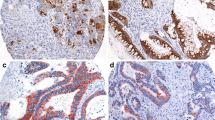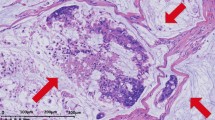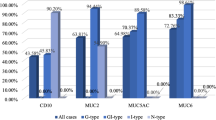Abstract
Objective
To evaluate the association between mucin 2 (MUC2) expression and clinicopathological characters of colorectal cancer.
Methods
A literature search was performed on December 31, 2010 according to defined selection criteria. We evaluated the correlation between MUC2 (detected by immunohistochemistry) and clinicopathological characters of colorectal cancer. According to the tumor histological type, differentiation, location and TNM staging of colorectal carcinoma, we divided the clinicopathological characteristics into different subgroups. Fixed and random effects models were applied for estimation of the summarized risk ratios (RRs) and 95% confidence intervals (CIs) in different subgroups. Finally, forest plots and funnel plots were created to allow for visual comparison of the results or the effect of publication bias.
Results
According with the inclusive criteria, fourteen studies (n=1,558) were eligible for the meta-analysis. We observed a trend towards a correlation of MUC2 higher positivity in mucinous than non-mucinous carcinoma (RR, 2.10; 95% CI, 1.30–3.40; P=0.002) and less positivity in distal than proximal colon (RR, 0.74; 95% CI, 0.64–0.85; P=0.000). There was no statistically significance for the association between MUC2 expression and differentiation or TNM staging of colorectal cancer, but MUC2 overexpression tended to be associated with the presence of T stage tumor (RR, 1.17; P=0.052).
Conclusion
MUC2 overexpression was associated with the mucinous and proximal colorectal cancer.
Similar content being viewed by others
References
Byrd JC, Bresalier RS. Mucins and mucin binding proteins in colorectal cancer. Cancer Metastasis Rev 2004; 23:77–99.
Velcich A, Yang W, Heyer J, et al. Colorectal cancer in mice genetically deficient in the mucin MUC2. Science 2002; 295:1726–1729.
Aksoy N, Corfield AP, Sheehan JK. Preliminary study pointing out a significant alteration in the biochemical composition of MUC2 in colorectal mucinous carcinoma. Clin Biochem 2000; 33:167–173.
Taylor CR. Standardization in immunohistochemistry: the role of antigen retrieval in molecular morphology. Biotech Histochem 2006; 81:3–12.
Gurevich LE, Kazantseva IA, Korsakova NA, et al. Expression of type 1 and type 2 mucins in colonic epithelial tumors. Arkh Patol 2007; 69:12–16.
Korsakova NA. Peculiarities of E-cadherin, mucin-2, and Ki-67 expression in colon adenocarcinoma. Arkh Patol 2003; 65:15–18.
Chiang JM, Yeh CY, Changchien CR, et al. Mucinous adenocarcinoma showing different clinicopathological and molecular characteristics in relation to different colorectal cancer subgroups. Int J Colorectal Dis 2010; 25:941–947.
Tozawa E, Ajioka Y, Watanabe H, et al. Mucin expression, p 53 overexpression, and peritumoral lymphocytic infiltration of advanced colorectal carcinoma with mucus component: is mucinous carcinoma a distinct histological entity? Pathol Res Pract 2007; 203:567–574.
Park SY, Lee HS, Choe G, et al. Clinicopathological characteristics, microsatellite instability, and expression of mucin core proteins and p53 in colorectal mucinous adenocarcinomas in relation to location. Virchows Arch 2006; 449:40–47.
You JF, Hsieh LL, Changchien CR, et al. Inverse effects of mucin on survival of matched hereditary nonpolyposis colorectal cancer and sporadic colorectal cancer patients. Clin Cancer Res 2006; 12:4244–4250.
Yang YF, Guo HL, Zhang L, et al. Expressions of mucin MUC2 and MUC3 in colorectal carcinoma and their clinical significance. Zhong Hua Zhong Liu Fang Zhi Za Zhi (in Chinese) 2006; 13:1866–1868.
Li L, Zhao JH, Wang JS, et al. Expressions and clinical significance of MUC2 and MUC5AC protein in colorectal carcinoma. Dong Nan Da Xue Xue Bao (Yi Xue Ban) (in Chinese) 2006; 25:382–385.
Iwase T, Kushima R, Mukaisho K, et al. Overexpression of CD10 and reduced MUC2 expression correlate with the development and progression of colorectal neoplasms. Pathol Res Pract 2005; 201:83–91.
Baldus SE, Mönig SP, Hanisch FG, et al. Comparative evaluation of the prognostic value of MUC1, MUC2, sialyl-Lewis (a) and sialyl-Lewis (x) antigens in colorectal adenocarcinoma. Histopathology 2002; 40:440–449.
Jang KT, Chae SW, Sohn JH, et al. Coexpression of MUC1 with p53 or MUC2 correlates with lymph node metastasis in colorectal carcinomas. J Korean Med Sci 2002; 17:29–33.
Huang WB, Shi LH, Zhu XQ, et al. Expression of mucin MUC1 and MUC2 in colorectal carcinoma and their clinical significance. Ai Zheng (in Chinese) 2002; 21:1231–1234.
Sylvester PA, Myerscough N, Warren BF, et al. Differential expression of the chromosome 11 mucin genes in colorectal cancer. J Pathol 2001; 195:327–335.
Matsuda K, Masaki T, Watanabe T, et al. Clinical significance of MUC1 and MUC2 mucin and p53 protein expression in colorectal carcinoma. Jpn J Clin Oncol 2000; 30:89–94.
Manne U, Weiss HL, Grizzle WE. Racial differences in the prognostic usefulness of MUC1 and MUC2 in colorectal adenocarcinomas. Clin Cancer Res 2000; 6:4017–4025.
Hanski C, Hofmeier M, Schmitt-Gräff A, et al. Overexpression or ectopic expression of MUC2 is the common property of mucinous carcinomas of the colon, pancreas, breast, and ovary. J Pathol 1997; 182:385–391.
Ajioka Y, Allison LJ, Jass JR. Significance of MUC1 and MUC2 mucin expression in colorectal cancer. J Clin Pathol 1996; 49:560–564.
Perez RO, Bresciani BH, Bresciani C, et al. Mucinous colorectal adenocarcinoma: influence of mucin expression (Muc1, 2 and 5) on clinico-pathological features and prognosis. Int J Colorectal Dis 2008; 23:757–765.
Lugli A, Zlobec I, Baker K, et al. Prognostic significance of mucins in colorectal cancer with different DNA mismatch-repair status. J Clin Pathol 2007; 60:534–539.
Kang H, Min BS, Lee KY, et al. Loss of E-cadherin and MUC2 Expressions Correlated with Poor Survival in Patients with Stages II and III Colorectal Carcinoma. Ann Surg Oncol 2011; 18:711–719.
Author information
Authors and Affiliations
Corresponding author
Additional information
This research was supported by Medical Science and Technology Development Foundation of Nanjing, China (No.YKK10096).
Rights and permissions
About this article
Cite this article
Li, L., Huang, Pl., Yu, Xj. et al. Clinicopathological significance of mucin 2 immunohistochemical expression in colorectal cancer: A meta-analysis. Chin. J. Cancer Res. 24, 190–195 (2012). https://doi.org/10.1007/s11670-012-0190-z
Received:
Accepted:
Published:
Issue Date:
DOI: https://doi.org/10.1007/s11670-012-0190-z




